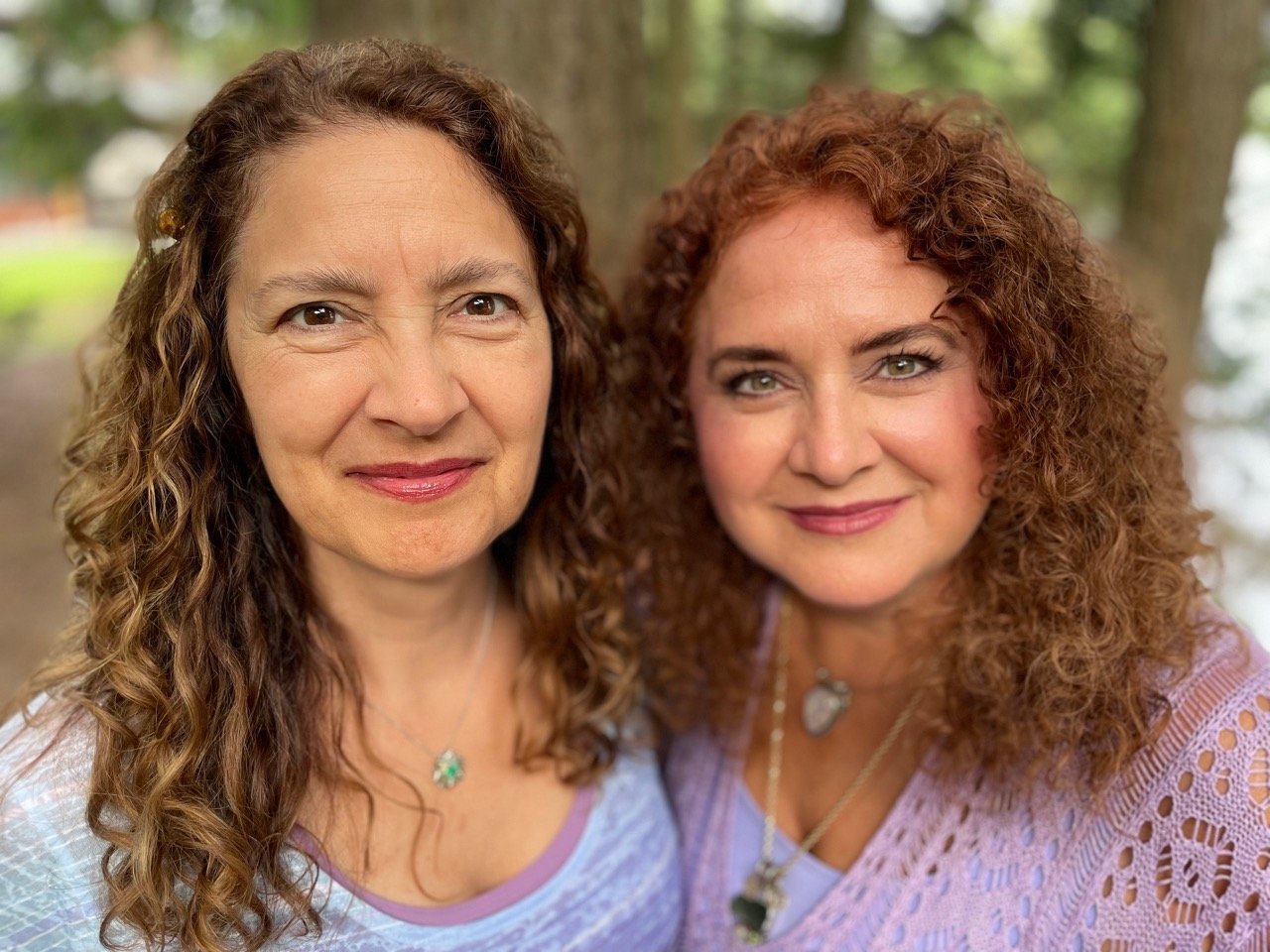Recovering from childhood trauma to rebuild the sibling bond
/Ronni Tichenor and Jennie Weaver are sisters and survivors who found a way to emerge from a tragic cycle of intergenerational trauma and abuse
Ronni and Jennie grew up in a home with abuse, addiction and mental illness. There is a lot of conversation around these issues nowadays about recovery from childhood trauma, its impact and how it can be difficult to realise that you grew up in a home with these dynamics because denying that these things are going on can be common. Sometimes this denial lasts to adulthood.
Both of them took some time to figure out what had happened to them in their childhood and have spent the last couple of decades trying to recover from their experiences. One of the things they noticed as they tried to get information and educate themselves about the dynamic they had experienced as children is that there is a lot of talk about childhood trauma these days but not a lot of discussion about what happens to siblings.
The relationship between siblings is nearly always damaged in some way in homes like theirs. Its not their fault because the dynamics the parents set in motion often sets children against each other in very explosive ways. Children can grow up and have really tough relationships with their siblings or be estranged from their siblings and not realise that it’s not their fault. The fact that Ronni and Jennie were able to come back together and heal the relationship in addition to healing individually is something they didn't see a lot of people talk about so that is why they are trying to bring that forward in the conversation.
Siblings can have different experiences, especially male and female relationships. Often one sibling is on the side of one parent and the other is on the side of the other?
Jennie was the youngest of three children and she was identified as the patient or scapegoat if you use the terms talked about with addiction. Ronni was the oldest and the hero. She was set up to succeed and to be the champion of the family. Jennie’s role was to be the problem of the family. She was a sensitive child and very intuitive so was constantly trying to read the mood of the room and her parents to try to avoid the next explosion. She really didn't feel particularly closer to one or the other - they were equally frightening in their ability to rage and to afflict pain. She feels Ronni seemed at times to be a confident of father so there was definitely a constant loyalty of ‘who do you love more’. That's probably very common in families with these issues.
Ronni agrees that they had different roles that they played and although neither of them was fun, Jennies’ was terrible. There were times when Ronni felt that her father was trying to draw her into being his confident, especially during her teen years. Her mother did that as well sometimes so there was a loyalty trap. It was also difficult because when her father was looking for looking for someone to talk it was because he felt he couldn't talk to her mother in that way - it was both flattering and troublesome that she was being put between her mother and father. It was just one of a number of uncomfortable and unhealthy dynamics that were set into motion n homes like theirs.
If you are a single child and you’re abused there is a different set of dynamics going on. In families are all the siblings involved or is the abuse confined to one and with the others not being part of it?
It’s unusual to have just one sibling targeted. You’re targeted in different ways. Their parents were verbally and physically abusive to all of them but because of her role as the ‘hero’, Ronni received less of that than Jennie did. Jennie got the brunt of it and that disparity intensified into adulthood. It got to the point where they had to break contact with their parents and their brother because they realised what was happening and wanted to get help whilst their parents and brother did not. This happened when Ronni and Jennie were in their late 20’s/early 30’s and whilst Ronni was getting much less of the abuse, Jennie was constantly targeted. There can be disparities but usually all the siblings get some measure of maltreatment. Their brother was abused as well although he did not see it that way – when they tried to point out the abuse he had endured when he was growing up he couldn't see it and sided with their parents as they were trying to pull out of denial.
It is quite common that you see different roles. They are almost strategic partnerships or relationships that build because sometimes the best defence is to appear to join the enemy. When you were experiencing the abuse did you talk about it or was it only later that you began to unpack it that you discovered what was going on? How did that awareness of each other’s role come about?
Jennie feels it really evolved over time. They both knew that they wanted very different types of marriage to what they had witnessed growing up. They both married really good men and as they started to have their children they started to talk about parenting and how they wanted to parent. One weekend Ronni invited Jennie to visit alone with her 8 month old daughter. Ronni knew Jennie was really struggling – she was living with their parents as her husband was overseas on Operation Desert Storm and there wasn’t a lot of direct communication with each other. They were still entrenched in part in denial and what therapists would call triangular communication – in order to maintain control somebody in the family had to be controlling the communication. At that time most of the communication was running through their mother who kept a tight lid on what she decided to share, which often wasn't accurate at all. It was all part of maintaining loyalty and keeping them in line.
The weekend was a big deal and Jennie received a lot of flak from their parents but it turned out to be an opportunity for Ronni and Jennie to open up. As soon as Jennie walked in the door Ronni realised she was suffering from severe depression. Over the weekend they started to talk and they stepped out of denial and broke the taboo of silence by discussing the family dynamics and how their parents were treating Jennie.
It’s often the case that each individual sibling treats what’s happening as a secret and doesn't share it. There is a futility to those years where you don't realise that you have somebody else, that you have a supporter or ally. There must be part of the sickening sense of waste that comes from this?
You are so entrenched in the denial and following those ever changing roles of control. Its about controlling each of the children and they realised as they started to talk to each other how isolated they were from each other and their emotional needs. They didn't really talk much directly to each other about what was going on because they were conditioned to keep silent. You are conditioned to believe that after a horrible beating that you’re not hurt, too stop crying, I didn’t mean to hurt you so don't talk about it. When you are conditioned from infancy it takes a lot to break out those patterns and recognise the patterns and then talk about and have someone to talk about them with. A therapist who is well versed in abuse and addiction and the mental illness dynamics in families is imperative to start unpacking but to have a sibling to validate the memories and say ‘I was there’ ‘I remember that’ ‘you’re not imagining it’ accelerates your healing process dramatically.
One of the major challenges is building a relationship with a partner who is taking on someone who has been through such an experience. It creates trust or commitment issues and the need to not have the relationship you had with your parents. You need to construct something that is a figment of your imagination because you can’t use your experience. How do you begin to work with your partners in sharing issues and begin to develop relationship and parenting styles?
Ronni and her partner talked a lot in the beginning about what they wanted. They recognised patterns with both his father and her father and mother’s anger issues. It wasn't until she started going to counselling early in their marriage before they had their children that she started unpacking some of what had happened. Her husband was very supportive, he is a very healthy and loving person in his own right and they just wanted to work on creating the most loving relationship they could have with each other and then when they started having children to be the best parents they could. To parent as consciously as possible.
Ronni and Jennie have both pursued really successful careers and are examples of people who have not been defined by past significantly learned from it.
They have both taken what they were given as children and tried to figure out how to live their lives in a healthier manner and also use that information to help other people. Ronni feels that because we don't talk about these issues they are swept under the rug and society helps people stay in denial about what they have experienced because we don’t talk about it.
You learn from the process of sharing. You learn more about yourself in the process of enabling and helping other people. What was behind the decision to write the book?
Ronni and Jennie both felt that they had done a lot of research and that it was helpful to hear other peoples stories. It also helped them find the name what had happened to them. A therapist told them that it is really unusual for the hero and scapegoat to become as close as the two of them had and they started to think that there might be probably some kind of formulae that they could share in terms of what they did on their path to increase the possibility that other people could heal their sibling relationships as well.
You can find out more at www.ronniandjennie.com or https://www.facebook.com/theheartandsoulsisters
Their book is available at Healing Begins with Us: Breaking the Cycle of Trauma and Abuse and Rebuilding the Sibling Bond
You can listen to the podcast in full and find out further information here. Our upcoming guest list is also available along with our previous blogs.
Find out more about our innovative Resilience and Burnout solutions.






